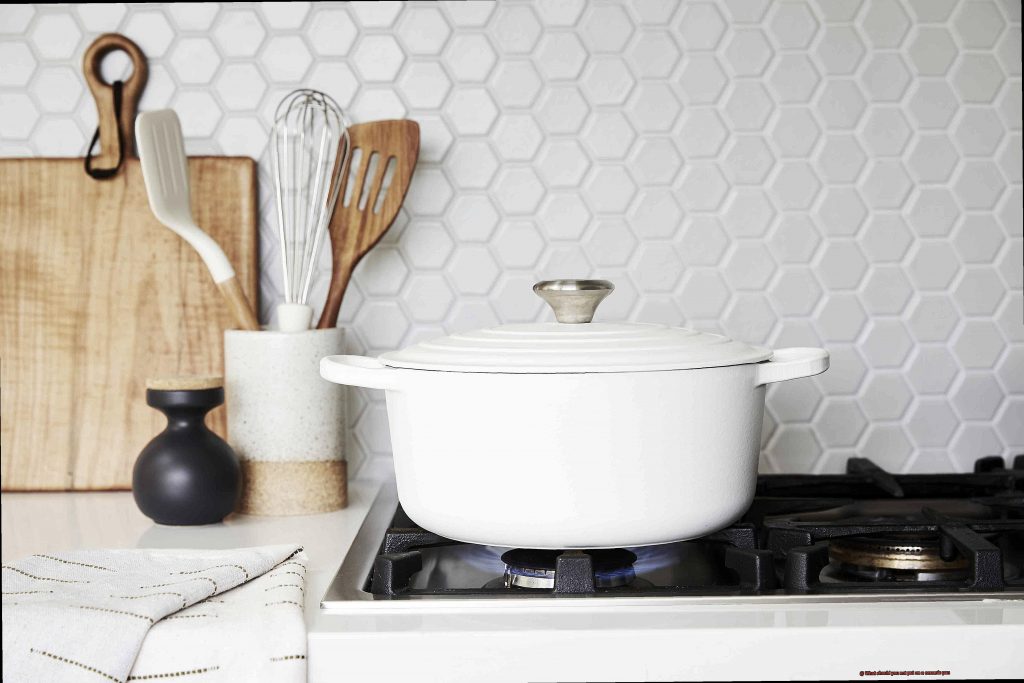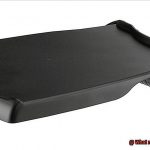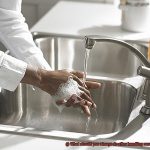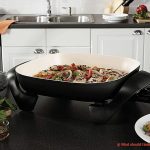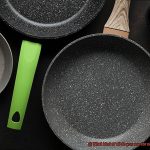Picture this: you’re in the middle of cooking a delicious meal on your favorite ceramic pan, but suddenly, disaster strikes. You hear a loud screech as your metal spatula scrapes against the surface of the pan, leaving behind unsightly scratches and marks. Sound familiar? If so, you’re not alone. Many home cooks have faced this frustrating problem at some point in their culinary adventures.
Ceramic pans are a popular choice for their non-stick properties and even heat distribution. But if you’re not careful with how you use and care for them, they can quickly lose their shine and effectiveness. So, what’s the secret to keeping your ceramic pans in top shape? It all comes down to knowing what not to put on them.
Believe it or not, there are certain types of heat, substances, and utensils that can cause serious damage to your ceramic cookware. Using metal utensils, exposing them to high heat, or using abrasive cleaners are all big no-nos that can lead to scratches, chips, and discoloration on your pan’s surface. And once that happens, your food is more likely to stick and cook unevenly.
But don’t worry. In this post, we’ve got you covered with everything you need to know about what not to put on a ceramic pan. We’ll debunk common myths and offer practical tips for proper care and maintenance. Plus, we’ll suggest alternative cooking tools and methods that will help extend the lifespan of your precious ceramic cookware.
So let’s get started. By following our advice and treating your ceramic pans with care and respect, you’ll be able to enjoy perfectly cooked meals without any unnecessary kitchen mishaps.
Contents
What is a Ceramic Pan?
Ceramic pans are a game-changer for anyone seeking a healthier and eco-friendly non-stick cooking surface. These pans feature a ceramic-based coating made from natural materials such as clay and sand, which is then baked at high temperatures to create a smooth, glossy finish that is both durable and non-toxic.
One of the most significant benefits of using ceramic pans is their non-stick properties. Unlike traditional non-stick pans that contain harmful chemicals like PFOA and PFTE, ceramic pans provide a safe cooking surface for you and your family. Plus, they are highly durable and can withstand high temperatures without warping or cracking.
However, it’s important to note that ceramic pans are not entirely scratch-resistant. Using the correct utensils like wooden or silicone ones is essential to avoid damaging the surface. Also, some ceramic pans may not be suitable for use on induction cooktops, so it’s crucial to check the manufacturer’s instructions before using them on an induction stove.
To keep your ceramic pans in excellent condition, there are some things to avoid that could damage the surface. These include metal utensils, abrasive cleaners, high heat, acidic foods, and glass cookware.
Why Should You Not Put Metal Utensils On a Ceramic Pan?
Well, here’s a tip for you: avoid using metal utensils on it. While ceramic pans are non-toxic and durable, they can easily be scratched by metal utensils. This can result in uneven cooking, and the ceramic coating may even break down over time.
But that’s not all. Metal utensils can also leave behind small metal particles that can be harmful to your health. These particles can stick to the surface of your pan and even get into your food. Avoiding metal utensils is an important step in maintaining a safe and healthy kitchen environment.
So, what should you use instead? There are a few options available that won’t damage your ceramic pan. One of the best alternatives is silicone utensils. They’re non-scratch, heat-resistant, and come in a range of fun colors and shapes to add personality to your kitchen. Plus, they won’t leave any unwanted flavors or odors on your food.
Another option is wooden utensils. They’re gentle on ceramic pans and won’t leave scratches behind – just make sure to clean them thoroughly after each use to avoid any absorption of flavors or odors.
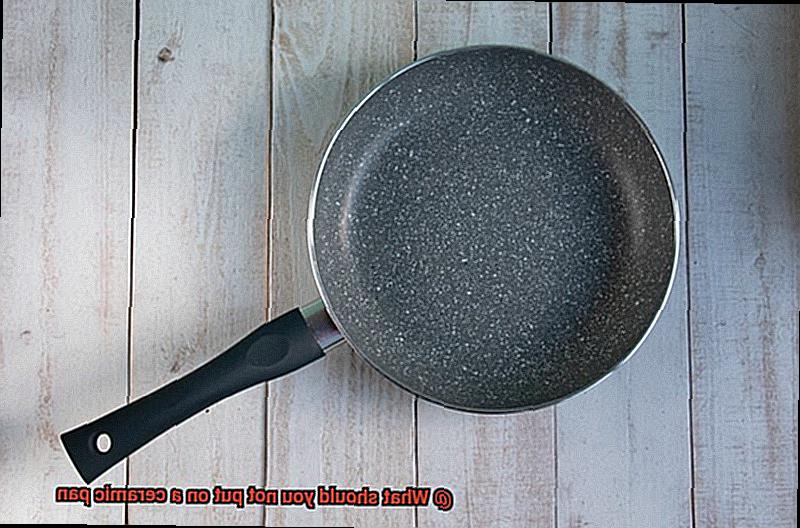
What Abrasive Cleaners Should You Avoid Using on a Ceramic Pan?
Ceramic pans are a delightful addition to any kitchen, thanks to their non-stick surface and ease of cleaning. However, in order to keep them in tip-top shape, it is crucial to steer clear of abrasive cleaners that can cause damage and shorten their lifespan.
Abrasive cleaners are the arch-nemesis of ceramic pans. These cleaning solutions contain tiny particles that can scratch and mar the pan’s surface, leading to damage and potentially exposing the underlying metal. Steel wool pads, scouring pads, and powders like baking soda or Comet are all abrasive cleaners that should be avoided when cleaning your ceramic pan.
Instead, gentle cleaning solutions are your best bet. A mixture of dish soap and warm water or vinegar and water can effectively clean your pan without causing any damage. If you’re dealing with tougher stains or stuck-on food, try soaking the pan in warm soapy water for a few minutes before gently scrubbing with a soft sponge or brush.
In addition to abrasive cleaners, metal utensils can also mar the surface of your prized ceramic pan. Metal utensils can scratch the surface of the pan, leading to damage and potentially exposing the underlying metal, which can cause food to stick. Opt for silicone or wooden utensils that won’t leave any unwanted flavors or odors on your dishes.
To recap, here are some tips to keep in mind when taking care of your ceramic pan:
- Avoid abrasive cleaners like steel wool pads, scouring pads, and powders like baking soda or Comet.
- Use gentle cleaning solutions like dish soap and warm water or vinegar and water.
- Soak the pan in warm soapy water before scrubbing with a soft sponge or brush if dealing with tougher stains or stuck-on food.
- Use non-scratch utensils like silicone or wooden utensils instead of metal utensils.
How to Properly Handle High Heat When Cooking with a Ceramic Pan?
Cooking with a ceramic pan can be a great experience, but it’s important to handle high heat with care. Ceramic pans are known for their excellent heat retention properties, but they can easily get damaged when exposed to high temperatures. Here are some tips to help you properly handle high heat when cooking with a ceramic pan:
Preheat Slowly
To avoid damaging the surface of your ceramic pan, it’s essential to preheat slowly. Begin by setting the heat to low or medium-low and gradually increase the temperature as needed. This will help prevent hot spots and ensure even cooking.
Use the Right Oil
When cooking with a ceramic pan on high heat, you must use an oil with a high smoke point such as canola oil or vegetable oil. Avoid oils like butter or olive oil as they have a low smoke point and can burn quickly. Using the right oil not only enhances the flavor of your food but also prevents sticking and ensures even heating.
Avoid Sudden Temperature Changes
Ceramic pans are sensitive to sudden temperature changes that can cause thermal shock and crack the pan. Avoid placing a hot pan directly in cold water or putting a cold pan on a hot stove. Allow your pan to cool gradually before cleaning it.
Use Silicone or Wooden Utensils
When cooking with a ceramic pan, it’s best to use utensils made from silicone or wood to avoid scratching the surface. Metal utensils can quickly damage the ceramic coating, reducing its lifespan.
Clean with Care
After cooking, allow your ceramic pan to cool before cleaning it. Avoid using abrasive cleaners such as steel wool or rough sponges that can scratch the surface. Instead, use mild detergents and soft sponges when cleaning your pan.
What Acidic Foods Should You Not Cook in a Ceramic Pan?
It’s important to be mindful of the types of ingredients you’re cooking with in order to maintain the longevity of your ceramic pans.
Acidic foods have a low pH level and can lead to the breakdown and porosity of the ceramic surface. Citrus fruits, tomatoes, vinegar, and wine are some examples of acidic foods that should be avoided when using a ceramic pan. The acid in these foods can cause food to stick and make cleaning a hassle.
To cook acidic dishes without damaging your ceramic pan, opt for stainless steel or cast iron cookware. These materials handle acidic ingredients better than ceramic and won’t react with them in the same way.
It’s important to note that repeated use of acidic foods in a ceramic pan can lead to negative effects on its surface. To maintain the quality of your ceramic cookware, limit the use of acidic ingredients or reserve them for other types of cookware.
Why Is It Important To Avoid Glass Cookware On a Ceramic Pan?
You’ve made the right choice for your kitchen, but you may be wondering what cookware you can use on it without causing any damage. The answer is simple: avoid using glass cookware on a ceramic pan at all costs.
Glass cookware, although it may seem harmless, can cause severe damage to your beloved ceramic pan. Here’s why it’s essential to steer clear of glass cookware when using a ceramic pan:
Firstly, glass is a highly conductive material that can cause rapid temperature changes in your pan. This sudden change in temperature can result in thermal shock, causing the ceramic material to crack or shatter. You don’t want to end up with a broken pan, so it’s crucial to avoid using glass cookware on your ceramic pan.
Secondly, glass cookware can leave scratches and marks on the surface of a ceramic pan. These scratches create weak spots in the pan, making it more susceptible to cracking or breaking in the future. Additionally, glass cookware can leave residue on the ceramic surface that can be tough to remove, leading to discoloration and staining over time.
So what should you use instead? Stainless steel, aluminum, or non-stick materials are compatible with ceramic pans and are safe to use. These materials are excellent conductors of heat and won’t cause any damage to your pan.
How Can Taking Care of Your Cookware Help You Achieve Great Results in the Kitchen?
It may not be a problem with your cooking skills, but rather with your cookware. Taking care of your pots and pans is essential if you want to achieve great results in the kitchen. In this post, we’ll explore how taking care of your cookware can help you cook like a pro.
Firstly, let’s talk about ceramic pans. These are a popular choice for their non-stick properties and ability to distribute heat evenly. However, they require a bit of extra TLC compared to other types of cookware. To keep them in pristine condition, it’s important to avoid using metal utensils on them as they can scratch the surface and ruin the non-stick properties. Instead, opt for silicone or wooden utensils that won’t damage the pan.
Moreover, high heat can be detrimental to the longevity of your ceramic pan. Prolonged exposure to high temperatures can cause the pan to warp or crack, affecting its performance and lifespan. Hence, it’s best to use low or medium heat and give the pan time to heat up gradually.
Additionally, acidic ingredients such as tomatoes and vinegar should be used with caution when cooking in a ceramic pan. The acidity can wear down the protective layer of the pan, making it more susceptible to scratches and damage. So, be mindful of what you’re cooking and how you’re cooking it.
But it’s not just about ceramic pans – taking care of all types of cookware is important. For example, using the right utensils on non-stick pans can help prevent scratches and preserve their non-stick properties. Opt for silicone, nylon or wooden utensils instead of metal ones.
In addition, harsh abrasive cleaners should be avoided on your cookware as they can damage the surface and affect its performance. Instead, use gentle cleaners and avoid soaking your pans for too long.
Tips for Caring for Your Ceramic Pans
Caring for your ceramic pans is essential to ensure their longevity and effectiveness in the kitchen. Ceramic pans are a popular choice amongst cooks due to their non-stick surface, even heat distribution, and durability. Here are some tips to help you take care of your ceramic pans:
Mind the Utensils
The first tip is to avoid using metal utensils on your ceramic pans. Metal utensils can quickly scratch the non-stick surface of your pan and cause damage over time. Instead, use gentle silicone or wooden utensils that won’t scratch the surface.
Be Gentle with Cleaning
Harsh cleaners or scouring pads can also scratch the surface of your ceramic pans and affect their non-stick properties. Instead, use a soft sponge or cloth with mild soap and warm water to clean the pan.
Avoid High Heat
Ceramic pans are durable, but they are not designed for high heat cooking or broiling. Using high heat can cause the coating to break down and potentially release harmful chemicals into your food. So, avoid putting a cold ceramic pan on a hot stove or under a broiler for an extended period of time.
Store with Care
Finally, when storing your ceramic pan, make sure to stack it carefully with other cookware to avoid scratching the surface. Alternatively, you can hang it from a pot rack or store it separately in a cabinet.
upJBx555v3I” >
Conclusion
In summary, ceramic pans are a kitchen essential that offer excellent non-stick properties and even heat distribution. However, to ensure that they remain effective and long-lasting, it’s crucial to avoid using certain items on them.
Metal utensils, for instance, can cause scratches and chips on the pan’s surface. To prevent this, it’s best to use silicone or wooden utensils instead. Additionally, exposing your ceramic pan to high heat can lead to discoloration and breakdown of the coating. It’s therefore advisable to cook at medium temperatures and avoid broiling altogether.
Cleaning your ceramic pan is also critical in maintaining its quality. Using abrasive cleaners can cause scratches and damage the surface of the pan. Instead, opt for gentle cleaning solutions such as dish soap and warm water or vinegar and water.
Moreover, acidic ingredients like tomatoes and vinegar should be used with caution when cooking in a ceramic pan. The acidity can wear down the protective layer of the pan over time.
By following these simple tips on how to care for your ceramic pans properly, you’ll be able to enjoy perfectly cooked meals without any unnecessary kitchen mishaps. Remember always to take good care of your cookware if you want to achieve great results in the kitchen.

